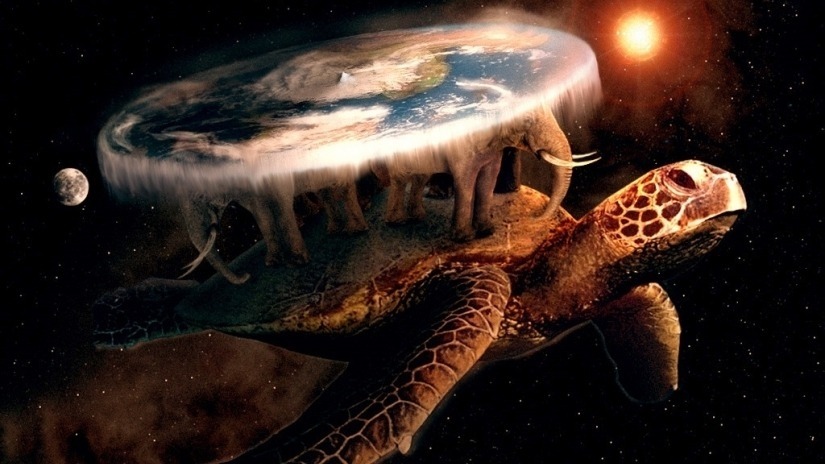We’ve seen a couple of attempts at establishing a Marvel-style cinematic universe crash and burn over the last few years. DC are stepping back to focus more on standalone films, and Universal have more or less abandoned their attempt at a Dark Universe. Only Fox’s X-Men universe is still going strong, and that’s not so much a cinematic universe as a succession of movies about related characters that don’t even take place in the same fictional universe or timeline as each other. And yet, Marvel continue to cover themselves in glory and box office records, with Black Panther and Avengers: Infinity War both in the worldwide all-time box office top ten already. Other movie studios are unlikely to have given up on the hunt for a successful cinematic universe yet, so we have a suggestion for them – the Discworld cinematic universe, or DCU (as opposed to the DCEU!).
There have been attempts to bring the Discworld to the big screen before, though they have tended to be derailed by unfortunate differences of creative opinion, like studio executives wanting to take the Death stuff out of Mort, a story about Death’s apprentice. Up until now, the Discworld has had more success finding a home on the small screen, in both animated and live action forms. Good Omens, the novel Pratchett wrote with Neil Gaiman, is also soon to come to the small screen. As fairly lengthy and plotty novels, really faithful adaptations of Pratchett’s stories work well in televised serial format.
But while the Discworld may be an overwhelming prospect for a single movie adaptation, that’s what makes it perfect fodder for a cinematic universe. The Discworld is a huge, sprawling place, full of exotic locations, colourful characters and climactic action set-pieces. The cast of characters is enormous and can be divided into a series of groups: Rincewind, other Wizards, the Lancre Witches, Tiffany Aching, Death and his Family, the City Watch, and Moist von Lipwig, plus six standalone novels that feature recurring characters but focus on someone new. This means that, just as in a comic book universe, the DCU could made up of several series of movies featuring particular characters or groups, all loosely inter-connected.
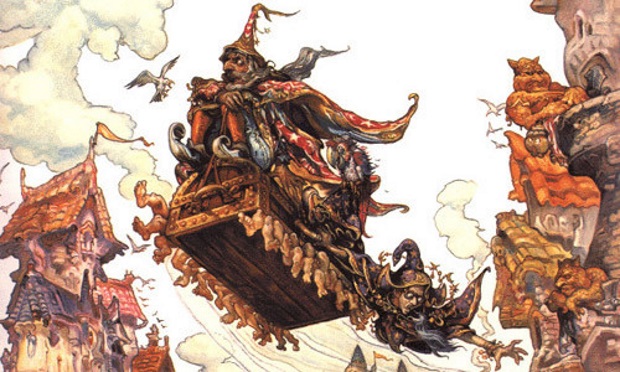
The Discworld also includes a city that is central to the plot of many stories, is the primary setting for a large number of the novels, and provides several different characters with a base of operations. Where the MCU has New York City, the DCU has Ankh-Morpork. With one core setting central to much of the action, it’s that much easier to include cameos from other characters in different movies, and to incorporate new characters into stories where they don’t necessarily appear in the original novels.
This is also key to a successful cinematic universe – fierce adaptation. These stories can’t just be plonked on the big screen in the same form as the novels. That doesn’t mean losing the spirit of the stories, but being willing to alter the plot details, to swap characters in and out of stories, to replace one character with another, and so on, to make the cinematic universe as a whole work and hold together.
If fans can embrace this type of faithful-to-the-spirit adaptations rather than faithful-to-the-letter ones (like Deadpool or most of the MCU), the Disc could inspire some fantastic big-screen adventures.
We realise that 41 Discworld novels, plus numerous short stories, maps, diaries full of extra information about Disc institutions, Companions and one picture book, is probably a daunting amount of material for any Hollywood exec to work through. And so, Hollywood, we’ve saved you the trouble by putting together a plan for four phases of the DCU ourselves. You’re welcome.
First of all, you want an opening film that stands almost entirely by itself, but incorporates small elements of the shared universe in such a way that doesn’t interfere with the narrative, but gets audiences excited to see more of the universe. You need relatable characters and a simple, exciting storyline. This is really important – you can afford a few mis-steps down the line (hello The Incredible Hulk, Thor: The Dark World) but if this first movie fails, the whole universe collapses (bye-bye, The Mummy).
For this crucial first film, we’d recommend Guards! Guards!, the first in the City Watch series. The Watch are among the most relatable characters on the Disc, led by grizzled Everyman Sam Vimes (not a million miles from Tony Stark in many ways). The story is a bit more grounded than a lot of the Discworld stories, and the main fantasy element is dragons, already familiar from Game Of Thrones. This film can also feature cameos from the Patrician (the ruler of Ankh-Morpork) and the Wizards of Unseen University (Ridcully, who only became Arch-Chancellor later in the book series, could be moved up so that he is already Arch-Chancellor here).
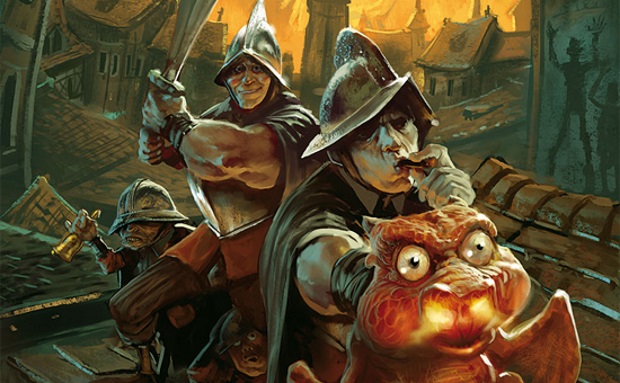
The biggest problem with Guards! Guards! is that it’s a bit male-dominated, something we’ve seen quite enough of in cinematic universes, so follow that up with Wyrd Sisters to introduce the Witches (Equal Rites is the first book featuring Granny Weatherwax, but it doesn’t introduce the other witches). Then introduce Death with Mort, and make sure you clearly indicate its setting is 16 years in the past. Return to the City Watch to get audiences back to Ankh-Morpork and whet their appetites for your first big team-up (and start getting some female characters into the Watch) with Men At Arms. Finally, introduce the Wizards properly with Moving Pictures, possibly making the lead character Rincewind or Ponder Stibbons (whichever one it is gets a make-over or upgrade in looks), to avoid focusing on someone we never meet again.
So Phase 1 looks like this:
1. Guards! Guards! (City Watch 1)
Mid-credits sting: Ponder Stibbons comes to tell Ridcully that the kingdom of Lancre has just re-emerged into the timestream after being frozen for 15 years, but no one knows why…
2. Wyrd Sisters (Witches 1)
Mid-credits sting: Death returns home, having left the reunited families of Lancre, and looks mournfully at an old portrait of a little girl in a pink dress…
3. Mort (Death 1)
Mid-credits sting: The head of the Assassins’ Guild congratulates Edward d’Eath on being the first person to score full marks for the post-graduate course.
4. Men At Arms (City Watch 2)
Mid-credits sting: Vimes, trying to relax into his new role, is told that the alchemists have invented some kind of moving pictures…
5. Moving Pictures (Wizards 1)
Mid-credits sting: Carrot reports to Vimes that there’s a new craze in town – Music With Rocks In.
6. Soul Music (Big Team-Up 1)
The big team-up stories are more difficult to do in the Discworld universe, as there are relatively few of this type of story among the novels. However, there are several novels that feature multiple groups, and plenty of novels that take place in Ankh-Morpork, making it relatively easy to incorporate the City Watch in some way. With a bit of creative adaptation, a team-up could be created.
For the first team-up, we’d suggest Soul Music. This means moving the order of the Death books around a bit, but Reaper Man doesn’t feature the rest of his family, so that should be fine. The Wizards are in the story anyway, and in the novels, Ridcully and Granny Weatherwax have a history, so one can call on the other and bring the Witches in. Much of the story features rock music wreaking havoc in Ankh-Morpork, so the Watch can be brought in as well.
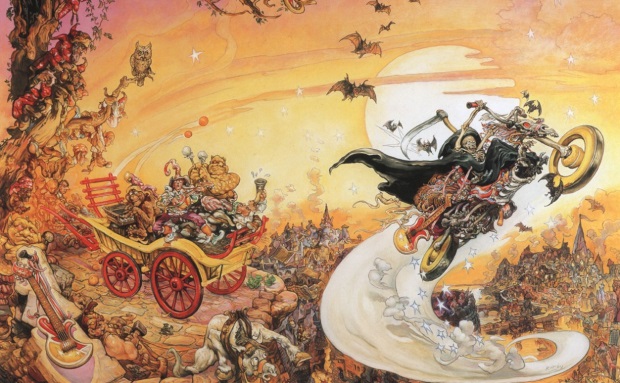
Phase 2 can be kicked off with The Colour Of Magic, sending Rincewind (already introduced with the Wizards) off on his own adventures (this could probably include content from both The Colour Of Magic and its direct sequel, The Light Fantastic). Otherwise, continue with sequels to phase 1, as follows:
7. The Colour Of Magic (Rincewind 1)
Mid-credits sting: a frog turns into a Duke.
8. Witches Abroad (Witches 2)
Mid-credits sting: The Patrician receives reports of the events in Genua, but he’s feeling poorly…
9. Feet Of Clay (City Watch 3)
Mid-credits sting: Wizard Windle Poons is on his deathbed, but he doesn’t seem to be actually dying…
10. Reaper Man (Death 2/Wizards 2)
Mid-credits sting: The Auditors, unhappy that they have been over-ruled, plan to eliminate another major figure, leading directly to…
11. Hogfather (Big Team-Up 2)
Hogfather is a huge, Christmas-themed extravaganza that once again features both Death and the Wizards. The City Watch’s cameos can be extended and, since it’s Hogswatch, the Witches can be invited to Ankh-Morpork to join the celebrations.
By this point, contracts will be expiring with your lead actors, so use phase 3 to offer potential retirement points for your main actors, after which they can do cameos (unadapted stories can be refigured for different lead characters later if need be). But whatever you do, make sure whoever plays Sam Vimes is tied into an everlasting contract. He can never be allowed to leave.
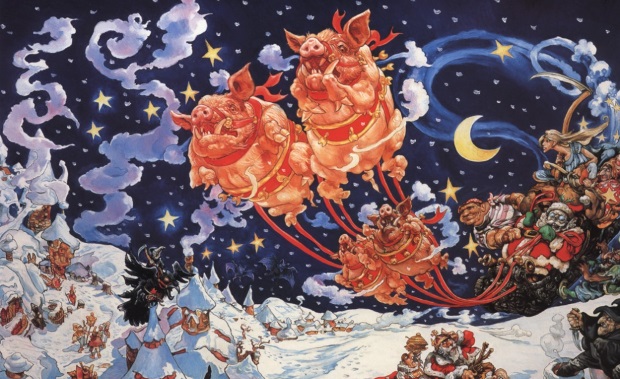
Phase 3 builds towards the third big team-up, The Last Hero, in which our heroes must save the gods from an angry horde. This is a very short illustrated novel and will need heavy adaptation, not least putting one of the Witches in the kite that flies to the heavens, but it already includes both the Wizards/Rincewind and the Watch, so that’s a start. The need to save the world provides an appropriately epic scale to it. Phase 3 therefore proceeds as follows:
12. Interesting Times (Rincewind 2)
Mid-credits sting: There are mysterious stirrings around Lancre’s standing stones.
13. Lords And Ladies (Witches 3/Wizards 3)
Mid-credits sting: The Watch are informed of a terrible theft from the Dwarf Bread Museum.
14. Jingo (City Watch 4)
Mid-credits sting: Wee Mad Arthur gets a message from his long-lost relatives in the Nac Mac Feegle.
15. The Wee Free Men (Tiffany Aching 1)
Mid-credits sting: A message is sent by clacks, but gets lost.
16. Going Postal (Moist von Lipwig 1)
Mid-credits sting: Cohen the Barbarian, now Emperor of the Agatean Empire, is getting bored…
17. The Last Hero (Big Team-Up 3)
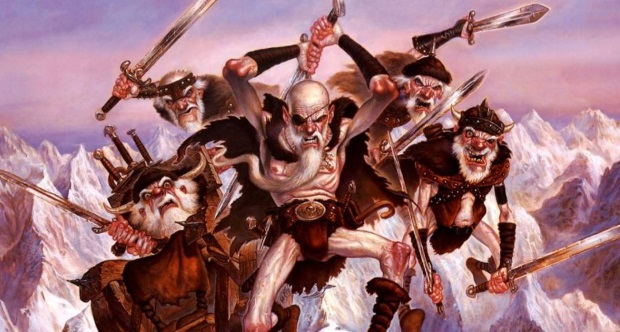
Phase 4 can then focus on Tiffany Aching and Moist von Lipwig, plus adapting Night Watch from the City Watch series and adding the odd prequel. Agnes Nitt can be replaced by Tiffany Aching in Carpe Jugulum, if necessary. This phase builds up to a fourth team-up that could twist timelines and alter history in such a way as to accommodate actor availability and all sorts of other practical considerations – Thief Of Time.
18. The Fifth Elephant (City Watch 5)
Mid-credits sting: The Witches hear of what’s happening in Uberwald, but are distracted by the fact the Witch Trials are coming up.
19. A Hat Full Of Sky (Tiffany Aching 2)
Mid-credits sting: Tiffany Aching meets an Omnian priest, Mightily Oats.
20. Small Gods (Prequel)
Mid-credits sting: Mightily Oats finishes telling Tiffany about Omnianism, and they hear that vampires are coming to Lancre.
21. Carpe Jugulum (Witches 4)
Mid-credits sting: The Ankh-Morporkians have invented something new – money that grows on trees.
20. Making Money (Moist von Lipwig 2)
Mid-credits sting: Rincewind is accidentally sent to the mysterious continent of Fourecks.
21. The Last Continent (Rincewind 3/Wizards 4)
Mid-credits sting: The Auditors are back, and they’re still not happy…
22. Thief Of Time (Big Team-Up 4)
After that time-twisting ride, the Disc is your oyster, as time travel can be used to manipulate the plot in all sorts of ways – there are still another 18 novels to adapt, including prequels, standalone stories, war stories and world-threatening wizardry….
You’re welcome, Hollywood. We expect to receive a cheque in the post.

